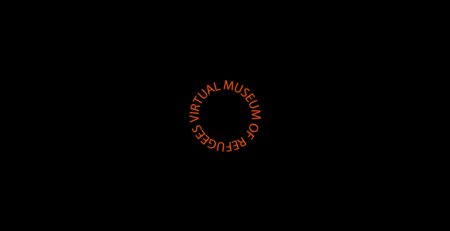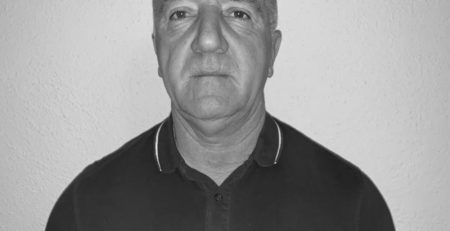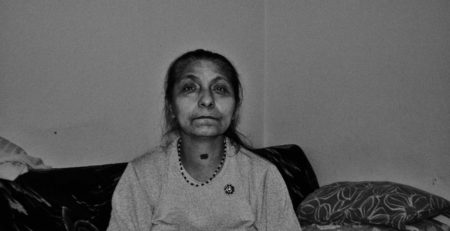Jehona Hasani
The interviewer: Welcome to this interview. Let’s start the story with when you as a family decide to leave the country. How was that period of time; tell us who were you with, how old you were, and everything you remember about it.
Jehona Hasani: I will try to tell you as much as I remember since it has been a long time. I was around 16 years old. I was with my parents and my grandparents and we were 7 siblings. All of our neighbors were going to Prishtina at Xhamia e Llapit. All our neighbors were leaving so we thought we should leave, too. It was March 1st. We left the house and we saw the whole neighborhood running down the streets – a crowd. My grandmother and grandfather didn’t come with us, they stayed at home. My parents with their 7 siblings. I stayed close to my dad.
The interviewer: Why did you stay close to your dad?
Jehona Hasani: Because he wanted to run away, he wanted to go back to his father…
The interviewer: Oh, so he wanted to stay here…
Jehona Hasani: Yes, he wanted to. He said he’d go and take his father but I didn’t trust him so I was keeping him close; I held his hand as I didn’t want him to go anywhere alone. My mom also told me to stay close to my dad as she gathered the other children near here to walk to Xhamia e Llapit and then to the train station.
The interviewer: Were there any militaries along the road?
Jehona Hasani: There were some but they didn’t do anything to us…till the train station, nobody did anything. The train came there from Peja in Belgrade’s direction. We were afraid to get on the train because we thought it would take us to Belgrade where they’d maltreat and kill us… or I don’t know what. But, we got on the train at last which was going in Macedonia’s direction. The train stopped in Lipjan in the evening; we stayed there till 11 in the evening – for 5 hours. They burnt down a mosque there.
The interviewer: In Lipjan.
Jehona Hasani: Yes, in Lipjan. When they burnt down the mosque, the Serbian military told us they would separate men from women and would burn us at a place near there. We stayed there for hours, but then moved on…
The interviewer: Do you remember whether it was crowdy on the train where you were sitting? Did you have a seat or did you have to stand?
Jehona Hasani: It was full of people. We were staying in the train’s aisle… it was full of people and we could only stay in the train’s aisle.
The interviewer: Did the police enter the train during the time you were in Lipjan?
Jehona Hasani: Of course. They would get on the train, shout and told us they would separate women from men and would burn us alive. We were scared. They scared us every time they spoke a word.
The interviewer: Then you set off from Lipjan…
Jehona Hasani: So we set off from Lipjan in the direction of Macedonia. We stopped in Bllaca but I am not sure how long we stayed there, but I know we didn’t stay the night there.
The interviewer: You didn’t stay the night…
Jehona Hasani: No, we didn’t. Perhaps we arrived there during the morning, but I don’t know what time was it, I just know we didn’t spend the night there; so we didn’t stay there for too long.
The interviewer: Was it muddy in Bllaca?
Jehona Hasani: It was muddy…
The interviewer: Then you crossed the border…
Jehona Hasani: We crossed the border and went to Çegran. In Çegran they took us to a school. We had to let them know about our arrival. So, the residents of Çegran would come there and claim like “I am here to take this family at mine since I have some room”. Someone whose cousin was living in Switzerland came to pick us up. This guy’s cousins had told him to give his house to a family since he wasn’t living there. He picked us since we were a bigger family; it was me, my siblings, my parents, and grandparents. Also, some of our neighbors were with us so we all got into that house. The house had two floors and we stayed there for 3 months.
The interviewer: You worked during those 3 months? How did it all happen?
Jehona Hasani: I don’t know. They would distribute the goods every day to help the families… so we could take food once a week on a certain day, and then clothing on another day. We would take different things within the week to certain locations where families would stock up with the necessary things. So, I went there where they were helping people with clothing. The girls and boys from Macedonia…
The interviewer: What were you working as?
Jehona Hasani: I would distribute clothes mainly, also some menstrual pads. When we returned back to Kosovo we took 4 bags of menstrual pads with us, although did not experience the menstrual cycle just yet. But, my mother would tell us to take them since we would need them quite soon. We got 4 bags of menstrual pads with us in Kosovo.
The interviewer: How do you remember the road back home? How did you return? How was the road?
Jehona Hasani: I don’t remember the road much. We were scared to return but there were some people returning home so we joined them, too. In June, I guess. We returned at some time in June. We filled a whole truck with everything we could. We tried to take the things they provided us with. We got on that truck and got here. We arrived and it was all ruined, destroyed. We were contemplating on why we got back here because everything seemed ruined. When we got home my grandfather was waiting for us. He was home. He thought we were all dead… he thought they had killed us.
The interviewer: How did he get that news?
Jehona Hasani: He thought he heard it on TV. He thought he heard the news that they killed us all. One of the neighbors who stayed with my grandfather had told him that they didn’t kill us but he’d still say “they killed them all, they killed them all”. Some refugees were also there in the house and when we got there the house seemed out of order. My grandfather was old, I am not sure how old he was, but he couldn’t do a thing. They had ruined the fridge, the cooker, and everything – the Albanian refugees who lived in our house. They had searched around the house and also stolen things.
The interviewer: They ruined your house?
Jehona Hasani: Yes, they ruined it…
The interviewer: During the time you were in Çegran, did you or your sisters attend school? Or you only worked?
Jehona Hasani: I didn’t attend school. My other big sister did… the others did not because they were young, they were 4. So, only my big sister went to school in the High School in Gostivar. Yes, it was a high school
The interviewer: So, you only got to work, you didn’t attend school?
Jehona Hasani: No.
The interviewer: Okay. Thank you very much.
The interviewer: Wait a moment… your uncle came in Çegran. Where did your uncle live?
Jehona Hasani: In Austria.
The interviewer: Okay. So he came from Austria to Çegran?
Jehona Hasani: Yes, my uncle came from Austria to pick us up and take us abroad because my mother was his only sister and we were a lot of children in the family, so he thought of doing us a favor by taking us abroad. We were looking for ways to move abroad. After we were located in that house the camp of Çegran was created so we were trying to find connections. You had to be part of the camp so that the relatives living abroad could help you move abroad. They helped us and made it look like we were staying in the camp. When my uncle came there we got all the required documents ready. But, my father didn’t want to leave the country. He didn’t want to because he couldn’t leave his mother, my grandmother behind. It was understandable, but my uncle couldn’t make it possible for my grandmother to go there, too. He already did all the work for the other 9 family members. And we…
The interviewer: So, you had to leave your grandmother behind…
Jehona Hasani: Yes, that was the only way so we didn’t leave at all.
The interviewer: None of you?
Jehona Hasani: My father didn’t agree with any of us leaving the country then. It wasn’t okay for the little children to get separated, or move abroad with only my mother. So my father decided we all stay in. But, my uncle did his part, he came to take us to Austria. My father disagreed, so we didn’t go.
The interviewer: Okay.




